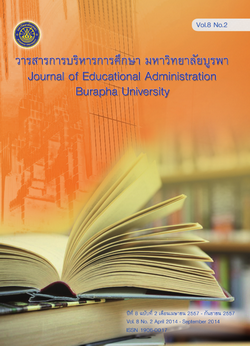ปัจจัยการบริหารงานวิชาการในการพัฒนาทักษะการคิดวิเคราะห์ที่มีประสิทธิผลของนักเรียน (Factors of Academic Administration in Facilitating Effective Analytical Thinking Skills of Primary Students)
คำสำคัญ:
การบริหารงานวิชาการ, การพัฒนาทักษะการคิดวิเคราะห์, Academic administration factor, Analytical thinking skill developmentบทคัดย่อ
บทคัดย่อ
การวิจัยครั้งนี้มีวัตถุประสงค์เพื่อศึกษาปัจจัยการบริหารงานวิชาการในการพัฒนาทักษะการคิดวิเคราะห์ที่มีประสิทธิผลของนักเรียนระดับประถมศึกษาผู้ให้ข้อมูล ได้แก่ ผู้บริหาร ครูผู้สอนและนักเรียนในโรงเรียนระดับประถมศึกษา สังกัดสำนักงานคณะกรรมการการศึกษาขั้นพื้นฐาน 3 แห่ง รวม 21 คน มีขั้นตอนการวิจัย 3 ขั้นตอน ประกอบด้วย 1) การศึกษาวิเคราะห์และสังเคราะห์ข้อมูลเกี่ยวกับปัจจัยการบริหารงานวิชาการในการพัฒนาทักษะการคิดวิเคราะห์ที่มีประสิทธิผลของนักเรียนระดับประถมศึกษา 2) การสัมภาษณ์เชิงลึกสังเกตและบันทึกภาคสนามโดยวิธีวิจัยเชิงปรากฏการณ์วิทยา และ 3) การวิเคราะห์และสังเคราะห์ข้อมูลเพื่ออธิบายปรากฏการณ์ที่เกิดขึ้น
ผลการวิจัยพบว่า
ปัจจัยการบริหารงานวิชาการในการพัฒนาทักษะการคิดวิเคราะห์ที่มีประสิทธิผลของนักเรียนระดับประถมศึกษา ประกอบด้วย ปัจจัยทางการบริหารและปัจจัยทางวิชาการ ปัจจัยทางการบริหาร ได้แก่ 1) ปัจจัยด้านภาวะผู้นำทางวิชาการประกอบด้วยการบริหารจัดการแบบมีส่วนร่วมการสร้าง ศรัทธา การสร้างแรงจูงใจ การสนับสนุนการจัดการเรียนการสอน และการเป็นผู้มีมนุษยสัมพันธ์ที่ดี 2) ปัจจัยด้านวิสัยทัศน์และนโยบายประกอบด้วย การกำหนดเป้าหมายร่วมกัน การพัฒนามุ่งสู่เป้าหมายและการเผยแพร่ประชาสัมพันธ์ 3) ปัจจัยด้านงบประมาณ ประกอบด้วย การจัดสรรงบประมาณ การระดมทรัพยากร การกำกับ ติดตาม ประเมินผล และรายงานผล และ 4) ด้านสิ่งแวดล้อม ประกอบด้วย การจัดอาคารสถานที่ การจัดบรรยากาศภายในโรงเรียนที่เอื้อต่อการคิดวิเคราะห์ จัดสื่อ แหล่งเรียนรู้และสิ่งอำนวยความสะดวก และจัดการเรียนการสอนที่เน้นทักษะการคิดวิเคราะห์ทุกชั้นเรียนอย่างต่อเนื่องส่วนปัจจัยทางวิชาการ ได้แก่ 1) ปัจจัยด้านหลักสูตรประกอบด้วย การพัฒนาหลักสูตรการพัฒนาครู การพัฒนากิจกรรมการคิดวิเคราะห์ และการสนับสนุนงบประมาณ 2) ปัจจัยด้านการจัดการเรียนการสอน ประกอบด้วย การพัฒนาครูด้านการเรียนการสอน การพัฒนาผู้เรียนอย่างรอบด้านการใช้มาตรฐานและตัวชี้วัดเป็นตัวกำกับ การจัดกิจกรรมการเรียนการสอนที่หลากหลายและการวิจัยในชั้นเรียน 3) ปัจจัยด้านการวัดและประเมินผลประกอบด้วย การวางแผนการวัดและประเมินผล การวัดและประเมินผลด้วยวิธีการหลากหลาย และการนำผลไปปรับปรุงการเรียนการสอนและ 4) ปัจจัยด้านการนิเทศประกอบด้วย การวางแผนการนิเทศ การใช้รูปแบบการนิเทศที่หลากหลายและนำผลการนิเทศไปใช้
Abstract
The purpose of this study was to study factors concern academic administration to develop effective analytical thinking skill of primary students. The major informants of this study consisted of twenty-one administrators, teachers, and students from three primary schools under the Office of Basic Education Commission. The study composed of three steps: (1) Data studying, analyzing, and synthesizing about factors concern academic administration to develop effective analytical thinking skill of primary students; (2) Phenomenological analysis by in-depth interview, observation, and taking field note; and (3) Analyzing and synthesizing for describing occurred phenomenon’s. The study revealed those factors of academic administration in facilitating effective analytical thinking skills of primary students composed of two key factors: Administrational factors and Academic factors. The administrational factors comprised of four factors:
(1) Instructional leadership those involved participant management, faith building, motivating, teaching support and good human relationship.
(2) Vision and policy those involved shared goals setting, oriented goals development and public relation.
(3) Budget those involved budget allocating, budget collecting and budget monitoring and evaluating.
(4) Environment those involved buildings setting, climate setting, learning resources and facilities setting and continuing oriented thinking skills teaching process. The academic factors were curriculum, learning and instruction, measurement and evaluation and supervision.
The academic factors comprised of four factors:
(1) Curriculum those involved curriculum development, teacher development, analytic thinking activities development and budget support.
(2) Learning and instruction those involved teacher development for instruction, holistic student development, monitoring by standards and KPIs, various learning activities and classroom research.
(3) Measurement and evaluation those involved measure and evaluate planning, various methods of measurement and evaluation and adoption of results to instruction development.
(4) Supervision those involved supervision planning, various methods for supervision model and application of supervision results.


